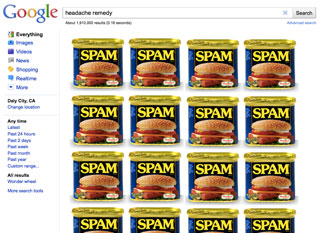Someone at Google–maybe Sergey Brin, maybe Larry Page, maybe just whoever’s in charge of choosing “Google Doodles” is a cartoon fan*. We know because the company sometimes pays tribute to cartoons and cartoonists. And it’s currently demonstrating its laudable good taste by using a Google logo featuring Will Eisner’s Spirit, the most notable work of one of the greatest comic artists ever. The art celebrates the 94th anniversary of the birth of Eisner, who passed away in 2005, and is inspired by his famous splash pages.
With the US Postal Service having long ago debased itself by releasing too many cartoon-related stamps featuring too many subjects that aren’t all-time greats, Google doodledom may be the highest honor currently being paid to comic art’s greats. Well done, Google.
*Actually, come to think of it, this 2008 Wired article by Steve Levy says that Google search boss Udi Manber likes cartoons–New Yorker cartoons, to be precise. Maybe he’s responsible for the Spirit tribute. Then again, we haven’t (yet) seen Google doodles commemorating the work of Peter Arno, George Price , or Barney Tobey…


 As Google and Facebook quibble over user data, the relationship between Facebook and Microsoft is only getting cozier.
As Google and Facebook quibble over user data, the relationship between Facebook and Microsoft is only getting cozier.
 ZDNet’s Mary Jo Foley has a funny way of referring to Microsoft’s new interface fascination: “
ZDNet’s Mary Jo Foley has a funny way of referring to Microsoft’s new interface fascination: “ So far, Google has been reluctant to directly block or demote content farms such as
So far, Google has been reluctant to directly block or demote content farms such as

